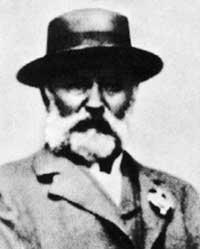Recent searches
Elhuyar Fundazioa
This German inventor was born in Paris on March 18, 1858. He studied in France and Germany because his parents were Germans. He was a good student and obtained a scholarship for the Polytechnic School of Munich, where he was under the tutelage of Carl von Linde, expert in refrigerators.
For two years he worked as a mechanic in Winterthur (Switzerland) and then returned to Paris to work as a thermology engineer, installer and seller for an international refrigeration company.

Diesel's most important invention was the Diesel engine. In 1890 he began experimenting with internal combustion engines and in 1897 he realized what is now known as diesel engine. This engine, considered a prototype, was similar to that of the explosion engines (Otto), but it did not work the same. Otto engines work by exploding the fuel and air mixture using a spark plug. In diesel engines, on the contrary, air is compressed and fuel is mixed. At that time, the mixture only turns on without sparks or spark plugs.
It is the main difference between gasoline and diesel engines. In the gasoline engine the air mixed in the carburettor and fuel enter the cylinder, and when the piston compresses the mixture the spark is removed in the spark plug and the explosion is formed. In diesel diesel diesel engine, however, pure air is introduced into the cylinder and heated a lot because the piston compresses more than in the gasoline engine. When the compressed air is very hot, the sprayed diesel is injected inside it and it explodes spontaneously without sparks.
The financial aid that Mr. Diesel needed to make its engine was awarded by an American brewer from Saint Louis, so the first Diesel engine was manufactured in the United States.
The advantages of this engine were the possibility of using heavier oils or diesel, the lower volume of the engine, the non-extraction of motor fumes, the reduction of the price of the fuel and the greater safety of the same. But at that time it also had its disadvantages: The diesel engine was heavy and was not used for light cars manufactured by Ford, nor for aircraft.
However, this invention attracted the attention of the navy and, invited by the British Admiralty, sailed on 29 September 1913 on the Dresden boat in Antwerp. During the trip between this port and Harwich fell into the sea unexpectedly and died drowned.





